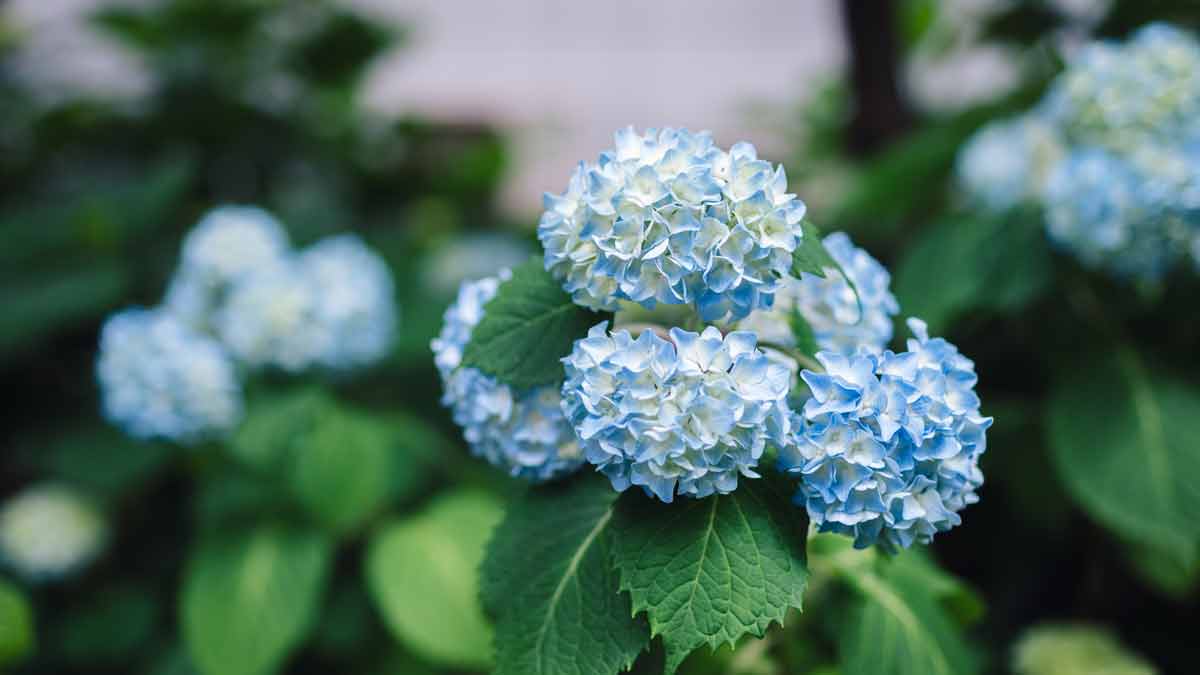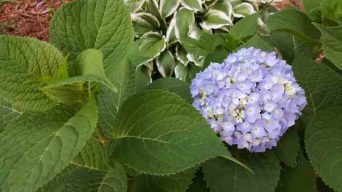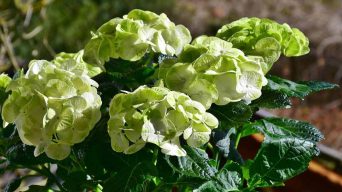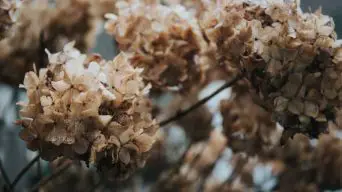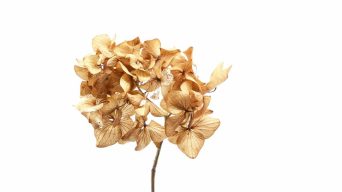Eggshells are beneficial for hydrangeas because they contain calcium, which makes the plant stronger and improves growth. They can also change the flower’s color. However, some sources caution against using eggshells because they may not break down quickly enough or could attract pests.
Hydrangeas are beloved for their stunning blooms, but did you know that a common kitchen waste item can significantly improve their growth and health?
Yes, we’re talking about eggshells!
Rich in calcium and other essential nutrients, eggshells offer numerous benefits to hydrangeas, including increased strength and improved soil acidity.
In this blog post, we’ll delve into the science behind these benefits while debunking some common misconceptions regarding the use of eggshells.
The Role Of Soil Acidity In Hydrangea Growth
Nestled in gardens and parks worldwide, hydrangeas are a beloved flowering plant known for their stunning blooms.
However, their growth is heavily reliant on one often overlooked factor: soil acidity.
The soil’s acidity levels dictate the plant’s ability to absorb vital nutrients, with calcium being a key player in developing those coveted hydrangea blossoms.
Understanding the interplay between soil acidity and plant growth is essential for cultivating these stunning flowers.
The Importance Of PH Levels And Calcium
Understanding the significance of pH levels and calcium for hydrangeas ensures these stunning plants’ optimal growth and overall health.
The pH level in soil significantly impacts a hydrangea’s ability to absorb essential nutrients, including nitrogen, phosphorus, potassium, and, most notably – aluminum.
Calcium is vital in promoting strong cell walls within plant structures, improving growth rates and vigor in your vibrant hydrangea garden.
Moreover, introducing calcium into the soil through natural means like eggshells benefits the overall health of your hydrangeas and contributes to maintaining balanced fertility within your garden’s ecosystem.
How Eggshells Can Help Hydrangeas Thrive
Eggshells have long been recognized as a versatile and cost-effective alternative to commercial fertilizers for adding valuable plant nutrients.
Their high calcium content benefits hydrangeas by strengthening cell walls, promoting healthy root growth, and improving plant vigor.
In addition to providing vital nutrients for your hydrangeas’ health, incorporating crushed eggshells into your garden can help regulate soil acidity levels.
As mentioned earlier, hydrangeas thrive in slightly acidic soils with an optimal pH range between 5.2 and 5.5.
However, too much acidity can hinder the absorption of aluminum necessary for vibrant blue flowers in bigleaf varieties.
Keep in mind that moderation is essential when using eggshells as a natural fertilizer; excessive application may lead to overly alkaline soil, which could negatively impact plant growth instead of helping it flourish.
Eggshells’ Nutrient Composition
In the peaceful realm of horticulture, every gardener aims to create an idyllic environment for their plants to flourish.
To this end, they seek natural remedies that promote healthy growth and eradicate harmful bacteria.
One such solution lies in the humble eggshell – a mineral-rich resource that can work wonders for hydrangeas.
Delve deeper to unveil this often-overlooked ingredient’s secrets and unleash your hydrangea garden’s full potential.
Rich In Calcium And Other Essential Minerals
Eggshells are an excellent source of calcium and other essential minerals that can significantly benefit hydrangeas.
Calcium is a crucial nutrient for plant growth, as it plays a vital role in cellular construction, supporting the development of healthy root systems and strong cell walls.
Not only do eggshells contain calcium, but they also have trace amounts of magnesium, phosphorus, potassium, and sodium – all essential for successful plant growth.
For example, magnesium promotes vigorous chlorophyll production, which contributes to the beautiful green hue on leaves, while potassium aids in flower production, creating bountiful blooms throughout your hydrangea plants.
Promoting Hydrangea Growth And Health
Eggshells are an excellent source of nutrients for hydrangeas, promoting growth and overall plant health.
The calcium found in eggshells is a crucial component that makes up the cell walls of plants, helping to strengthen stems and facilitate nutrient transport.
Calcium also plays a significant role in regulating soil pH levels, which is crucial for hydrangea growth.
Adding crushed eggshells to the soil around your hydrangeas can help increase calcium levels naturally while improving soil drainage and texture.
Eliminating Harmful Bacteria
One concern with using eggshells on hydrangeas is the potential for harmful bacteria to remain on the surface of the shells.
While eggshells are an excellent source of nutrients, these pathogens can cause plant problems, affecting growth and overall health.
Cleaning and preparing the eggshells before use is essential to eliminate this risk.
Some gardeners recommend washing them thoroughly in warm water or even baking them in an oven at a low temperature to sanitize them thoroughly.
How To Use Eggshells For Hydrangeas
Using eggshells for hydrangeas is a simple yet versatile technique that can provide numerous benefits.
From enriching the soil with calcium to enhancing foliar feeding, eggshells offer various options for plant lovers seeking optimal growth and vibrancy in their hydrangeas.
Let’s explore the different methods for incorporating eggshells into your gardening routine.
Crushed Eggshells As A Soil Amendment
One of the easiest ways to use eggshells as a natural fertilizer for hydrangeas is to crush them into small pieces and add them to the soil.
The calcium carbonate in eggshells is an excellent source of calcium, which plays a vital role in strengthening plant cell walls and improving overall growth.
Crushed eggshells can also help improve soil drainage and prevent pests such as slugs and snails from damaging plants.
To use crushed eggshells as a soil amendment, sprinkle the shells around the base of your hydrangea or mix them into potting soil before planting.
Composting Eggshells
Composting eggshells is an easy and effective way to add calcium to the soil of your hydrangeas.
Crush the eggshells into small pieces and mix them with other compost materials, such as grass clippings and food scraps.
Composted eggshells also help improve soil texture, allowing for better water retention and drainage in sandy or clay soils.
Additionally, adding organic matter to soil can help mitigate nutrient imbalances and promote plant health.
Infusing Eggshells For Feeding Plants
Infusing eggshells for feeding plants is a fantastic way to use them as natural fertilizers.
This process involves steeping crushed eggshells in water for several days, allowing the calcium from the shells to dissolve into the water, creating a nutrient-rich liquid that can be used to fertilize your hydrangeas.
To infuse eggshells, fill a large jar with crushed eggshells and cover them with water.
Let the mixture sit outside or on a windowsill in direct sunlight for about two weeks until it turns brownish-yellow.
Strain out any remaining shell pieces and dilute one cup of the infused liquid with one gallon of water before using it as fertilizer.
Eggshell Tea For Foliar Feeding
Another way to utilize the benefits of eggshells for hydrangeas is through foliar feeding.
Eggshell tea can be easily made at home by steeping crushed eggshells in water for several days, creating a nutrient-rich solution that can be sprayed on the leaves of your hydrangea plants.
The calcium and other essential minerals found in eggshells will penetrate your plant’s leaves, helping it grow healthier and stronger while protecting against harmful bacteria.
This method can benefit potted hydrangeas or those growing in soil with poor nutrient content.
Common Myths And Misconceptions About Eggshells
In gardening, the value of eggshells as a natural fertilizer for hydrangeas is often underestimated due to misconceptions about their use.
However, with the right knowledge and understanding, eggshells can be an incredibly beneficial addition to your soil.
Let’s debunk some common misconceptions and uncover the true potential of eggshells as a natural soil enhancer.
Debunking Common Misconceptions About Eggshells
There are many misconceptions about eggshells and their use in gardening.
Here are a few common myths that need to be debunked:
- Myth: Eggshells can deter slugs and snails from plants. While it is true that calcium carbonate, the primary component of eggshells, can cut up the bodies of slugs and snails as they crawl over them, this method is not an effective way to control these pests.
- Myth: Eggshells make your soil too alkaline. This myth stems from the belief that because eggshells are made up of calcium carbonate, they will raise the pH level of your soil. However, eggshells break down slowly and only add small amounts of calcium to the soil, which is excellent for plants with high acidity needs, like hydrangeas.
- Myth: Eggshells can replace all other fertilizers. While eggshells contain essential nutrients like calcium, they cannot completely replace other fertilizers. They should be used in conjunction with other organic fertilizers for best results.
- Myth: You should only use fresh eggshells in gardening. This misconception suggests that fresh eggshells are better than old ones. However, it’s important to note that both fresh and dry shells contain the same nutrients.
Understanding The True Value Of Eggshells In Soil
Eggshells are often overlooked in natural fertilizers but can be a valuable addition to your soil.
They contain calcium carbonate, an essential nutrient for plant growth and health.
Calcium helps to strengthen the cell walls of plants and improve their overall structure, ensuring that they can grow tall and strong.
One thing to remember is that not all plants will benefit from using eggshells as fertilizer.
Some plants may require more acidic or alkaline soil conditions than others, making them unsuitable for this treatment.
However, hydrangeas thrive in slightly acidic soils with sufficient calcium levels.
Eggshells can help increase the soil’s pH levels while also providing a source of calcium for the plant’s nutrition needs.
Other Natural Fertilizer Options For Hydrangeas
A lush and vibrant hydrangea plant is a true joy, but achieving such beauty requires proper nourishment.
While eggshells are a well-known source of natural fertilizer, other organic options can provide a wealth of nutrients for these gorgeous flowers.
From coffee grounds to banana peels and more, discover a variety of eco-friendly fertilizers that can help your hydrangeas thrive.
Coffee Grounds
Coffee grounds are a great way to fertilize some indoor plants naturally. They provide essential nutrients like nitrogen to the soil, vital for plant growth and development.
Not only do coffee grounds serve as a natural fertilizer, but they also act as an effective pest deterrent.
As the microbes in the soil break down the coffee grounds, they gradually release nutrients like nitrogen for your plants to use.
Banana Peels
Banana peels are an excellent supplement for growing hydrangeas, containing essential micronutrients that promote growth and blooming.
They are an excellent source of potassium, which is vital for the plant’s overall health.
However, using them in moderation is crucial since too much nitrogen can cause unwanted foliage growth and few fruits.
Aside from using banana peels for hydrangeas, they also make an alternative fertilizer for tomato plants.
A nano-fertilizer blend was developed using bananas’ chemical components to create a more efficient nutrient delivery system for crops.
This method uses natural compounds found in banana peelings instead of harsh chemicals that may harm the environment or damage other plants nearby.
Epsom Salt
Epsom salt, magnesium sulfate, has long been believed to benefit hydrangeas.
This natural mineral supplement is readily available and can help increase the plant’s overall health and growth.
Epsom salts can be a great addition to your hydrangea care routine when used in moderation.
To use Epsom salts on your hydrangeas correctly, mix one tablespoon of the mineral with one gallon of water and apply it directly to the plant’s leaves using a spray bottle.
You can add about two tablespoons per plant mixed into their potting soil or around their base for best results.
Overuse of Epsom salt may cause harm to your plants’ well-being; therefore, it is essential not to go overboard with its usage.
Organic Compost
Organic compost is an excellent natural fertilizer for hydrangeas, providing them with the essential nutrients they need to thrive.
Composting involves breaking down organic matter such as leaves, grass clippings, and food scraps into a nutrient-rich soil amendment.
This process releases nitrogen, phosphorus, and potassium into the soil, promoting plant growth and enhancing soil structure.
All-purpose compost suits most hydrangeas, while ericaceous compost works best to achieve blue flowers in certain varieties like bigleaf hydrangeas.
Applying organic compost annually can help retain moisture in the soil and reduce erosion while suppressing weeds.
It’s also more environmentally friendly than chemical fertilizers, which can harm beneficial soil organisms over time.
Final Thoughts
Using eggshells as a natural fertilizer for hydrangeas offers numerous benefits.
Eggshells contain essential nutrients that promote healthy growth and strong plant roots.
The calcium in eggshells also helps regulate soil acidity, which is crucial for optimal plant growth.
Adding crushed eggshells to your garden bed or compost heap ensures that your hydrangeas receive the maximum benefits of this organic fertilizer.

